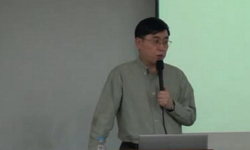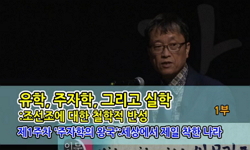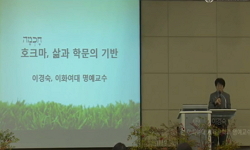朝鮮後期 實學者 가운데 李德懋는 利用厚生學派·北學派 實學者로 흔히 알려져 왔다. 孝德懋의 가문은 宗室 茂林君의 후손이었으나 그는 庶出이기 때문에 신분적인 제약을 받지 않을 수 없...
http://chineseinput.net/에서 pinyin(병음)방식으로 중국어를 변환할 수 있습니다.
변환된 중국어를 복사하여 사용하시면 됩니다.
- 中文 을 입력하시려면 zhongwen을 입력하시고 space를누르시면됩니다.
- 北京 을 입력하시려면 beijing을 입력하시고 space를 누르시면 됩니다.
https://www.riss.kr/link?id=T4442481
- 저자
-
발행사항
광주 : 전남대학교 교육대학원, 1997
-
학위논문사항
학위논문(석사) -- 전남대학교 교육대학원 , 교육학과 역사교육전공 , 1997. 2
-
발행연도
1997
-
작성언어
한국어
- 주제어
-
KDC
151.58 판사항(3)
-
발행국(도시)
광주
-
형태사항
40 p. ; 28 cm.
- 소장기관
-
0
상세조회 -
0
다운로드
부가정보
국문 초록 (Abstract)
朝鮮後期 實學者 가운데 李德懋는 利用厚生學派·北學派 實學者로 흔히 알려져 왔다. 孝德懋의 가문은 宗室 茂林君의 후손이었으나 그는 庶出이기 때문에 신분적인 제약을 받지 않을 수 없었고, 또한 일생 동안 가난하고 병약한 생활을 하였다. 매사에 조심스러우며 내성적인 성격인 그는 포부나 이상을 제대로 펼 수 없는 제약된 習俗의 사회제도에 대해 직접 불평을 토로한 적이 없었다. 그는 학문의 탐구와 저술을 주어진 환경에서 최선의 방법으로 여기며 자신의 修養을 쌓아 갔다. 특히 詩의 창작과 吟詠을 기쁨으로 받아들였고, 틈틈이 山水와 松菊·黃雀 그리기를 좋아했다. 또 때로는 交遊하는 많은 벗들과 유람도 하면서 詩로서 맺힌 울분을 발산했다. 이러한 개인적인 상황과 더불어 燕京行을 통하여 입수한 淸朝 考證學 및 서양 문물의 영향은 그의 학문적 경향을 특징 지우는데 큰 역할을 하였다고 보겠다.
李德懋는 학문을 생활화한 학자였다. 그의 학문하는 태도는 늘 窮究하는 자세로 일관하였고, 博而精의 독서법을 토대로 該博과 要約을 중시했다. 그는 독서의 목적을 현실 문제의 해결보다는 진리 그 자체를 추구하는 好學主義 및 人格陶冶에 두었다. 이러한 그의 학문 특징의 토대가 되고 있는 사상은 傳統 儒學이었다. 그의 사상의 근원은 儒學에 있었으며, 朱子擧으로부터 완전히 자유롭지는 못했다. 그러나 그가 애써 추구하는 것은 名物度數라고 스스로 표현한 바와 같이, 일상생활에 실용할 수 있는 小學의 道이며 小學 그 자체였다. 그는 사회변혁 보다는 개인의 人格陶冶를 통해 의식전환을 가져옴으로써 사회를 발전시킬 수 있다는 생각을 가졌다.
淸을 배우자는 北學思想은 商工技術을 발전시켜 새로운 측면에서 생산활동을 이룩하여야 한다고 주장했다. 그러기 위해서는 淸으로 부터 利用厚生에 필요한 발달된 생산 기술과 도구를 도입하여 오는 것이 급선무라고 강조하였다. 하지만 李德懋는 다른 사람들처럼 利用厚生의 경제적 측면을 강조하기 보다는 오히려 문학을 통한 계몽, 또는 교육을 통한 사회발전에 더 관심이 많았다. 또 淸 문물의 수용보다는 오히려 淸의 학문에 관심을 갖고 儒學의 새로운 방법론으로써의 考證學的 접근방법을 보여주었다. 李德懋懲는 傳統 儒學으로의 복고 정신이 남달리 강했다. 또한 현실 모순의 근원이 인간에 있음을 자각하고, 인간의 도덕성을 강력하게 촉구함으로써 도덕적 존재로서의 인간 확립을 통해 사회적 위기를 근원적으로 구원하고자 노력하였다. 이는 그의 實學期 현실 대응 태도가 다른 학자들과 비교하여 독자적이었음을 알 수 있겠다. 또한 李德懋는 博學考證的·百科全書的 학풍을 더욱 발전시키고 체계화시켜, 이와 같은 노력이 손자인 李奎景에 의해 계승됨으로써 考證學 발전의 토대를 마련하였다.
이처럼 李德懋는 北學派 實學者들이 관심을 가졌던 利用厚生學, 즉 현실의 민생문제 해결을 위한 적극적인 社會經濟策의 제시보다는 개인의 의식 전환을 통해 사회발전을 이루고자 하였다. 그는 학문의 목적을 觀念的인 人格陶冶에 두었기에 다소는 소극적이고 나약한 지식인이라는 느낌도 배제할 수 없다고 보겠다. 이와 같은 그의 특징은 그가 당시의 시대에 비추어 볼 때 儒敎에 경도 되어 있었다는 점이 가장 큰 이유가 되겠다. 또 그가 庶出이면서 末職이나마 官僚生活로 얻은 正祖의 총애라는 주변 배경과 이를 무시할 수 없었던 그의 성격도 영향을 주었을 것으로 보인다. 그는 언행이 남의 師表가 되었고 일생을 성실로 일관하였다. 또한 자신의 성격과 능력을 인식하고 어려운 환경 속에서도 많은 저술을 남겨 학문적 업적을 이룩함으로써 그 나름대로 공헌한 바가 컸다고 보겠다.
다국어 초록 (Multilingual Abstract)
Lee Tuk-mu is often known as one of those realists in the late Chosun Dynasty, who belonged to I-yong-hu-saeng-hak-pa (the school of scholars who emphasized the promotion of public welfare) & Puk-hak-pa. Though his family was the offspring of Murim-gu...
Lee Tuk-mu is often known as one of those realists in the late Chosun Dynasty, who belonged to I-yong-hu-saeng-hak-pa (the school of scholars who emphasized the promotion of public welfare) & Puk-hak-pa. Though his family was the offspring of Murim-gun (lord), a member of the royal family, he himself was born as an illegitimate son. Because of his illegitimate social status, he would have to endure many social restrictions and lead a poor and sickly life. Being a very cautious and reflective person, he never openly complained about the social structure and environment of his time, which put constraints on his aspiration and ambition. He built his character upon the belief that academic pursuit and writing were the best breakthrough in his social environment. He especially enjoyed writing poems and songs, as well as drawing landscapes, pine trees, chrysanthemums, and golden orjoles. He expressed his frustration through poetry while he was socializing and traveling with many of his friends. His personal background, along with his bibliographical study of Chinese classics from the Ch'ing Dynasty and the influx of Western civilization which he obtained through his trip to Yonkyong (the capital of the Ch'ing dynasty), influenced the shaping of his scholastic views.
Studying is a part of Lee Tuk-mu's life. His learning attitude was consistently sincere and prudent. He always emphasized profound teaming and condensation which was based on the method of reading developed by Park I-jong. He devoted himself to reading to pursue the truth itself and build a his own character, rather than to find solutions to problems in reality. The foundation of s scholarship was conventional Confucianism. The root of this ideology was in Confucianism, but not completely free from the teachings of Chu-lzu. However, he strived to achieve the teachings of So-hak, the ideology, which was more applicable in real life. He himself described So-hak, as Myong-mul-do-su (all real objects as opposed to something ideal or spiritual). He believed that a society could develop by changing the ways of thinking, which could be brought by individuals cultivation of character, rather than the social reform.
According to Puk-hak ideology, which advocated the acceptance of the civilization from the Ch'ing dynasty, manufacturing activities wete to be pursued from a new aspect by developing commercial-industrial technology. To realize this, it also claimed that importing more advanced manufacturing technology and tools from Ch'ing, necessary for I-yong-hu-saeng (promotion of public welfare), was most urgent. However, Lee Tuk-mu was more increasted in social development based on individual enlightenment through literature and education rather than emphasizing economic aspect of I-yong-hu-saeng like other realist scholars of his time. Being more involved in the studies of the Ch'ing dynasty, rather than absorbing its culture, he introduced an approach to historical research based on a new Confucian methodology, Lee Tuk-mu had a strong tendency to go back to Confucianism. He thought that the source of contradictions in reality lay in humans, and he tried to salvage the social crisis by strongly urging human morality and to establish mankind as moral being. This showed his individuality in his realistic attitude in coping with the current situations of that time compared to other scholars. Also, Lee Tuk-mu systematically developed and organized a method of study, which was an erudite, historical research method based on the encyclopedic knowledge Thus, he placed the foundation for the development of a bibliographical study of Chinese classics, and his effort was continued by his grandson Lee Kyu-kyong.
Lee Tuk-mu tried to achieve social development by changing an individual's way of thinking rather than suggesting more aggressive socio-economic policies to solve the real problems of people. His approach to social problems, known as I-yong-hu-saeng-hak (a study for the promotion of the public welfare), was also common among the realists on Puk-hak school. He placed his purpose of study in ideal character-building, which could characterize him as a rather passive and timid intellectual. The crucial element in his individuality as a realist was that he was under the strong influence of Confucianism at that time. His social views were also influenced by his awareness of king Chong-jo's attention to him which he received as a low level bureaucrat in spite of his social status as an illegitimate son, which he could not ignore. He was a role model to others, and he lived his life with sincerity, Recognizing his own personality and capability, he contributed a lot through a great academic achievement and by leaving many writings behind overcoming his difficult and hard environment.
목차 (Table of Contents)
- * 國文 抄錄 = 1
- I. 머리말 = 3
- II. 생애와 활동 = 5
- 1. 출생과 성장 = 5
- 2. 관직생활 = 9
- * 國文 抄錄 = 1
- I. 머리말 = 3
- II. 생애와 활동 = 5
- 1. 출생과 성장 = 5
- 2. 관직생활 = 9
- 3. 交友관계 = 14
- III. 저술의 내용과 학문경향 = 17
- 1. 저술의 내용 = 17
- 2. 학문경향 = 20
- IV. 맺음말 = 34
- * 參考文獻 = 36
- * Abstract = 39












